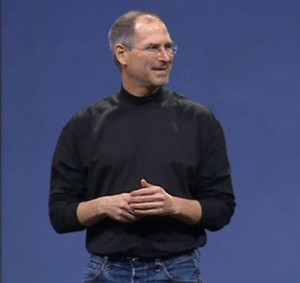If you have any doubt about how leadership is personal, checkout Steve Jobs. Doesn’t matter what you think about the smart folks in Cupertino, CA or their products. The bottomline is that the organization we know as Apple rises and falls on Steve Jobs.
 Jobs announced he’s taking a medical leave. He’s continuing as CEO but taking a break to concentrate on his health. The timing is not an accident (almost everything Apple does is thoughtful and careful, in my opinion). The US markets were closed for MLK Day, but the first report from overseas was that Apple stock dropped 8% in Frankfurt on the news. The day after the announcement, Apple’s stock dropped, rallied and generally fluttered about.
Jobs announced he’s taking a medical leave. He’s continuing as CEO but taking a break to concentrate on his health. The timing is not an accident (almost everything Apple does is thoughtful and careful, in my opinion). The US markets were closed for MLK Day, but the first report from overseas was that Apple stock dropped 8% in Frankfurt on the news. The day after the announcement, Apple’s stock dropped, rallied and generally fluttered about.
I rest my case. Jobs’ health directly impacts Apple’s health.
And I, like you, have heard about Jobs’ notorious temper and his take-no-prisoners approach to meetings and subordinates. I’m not sure I’d want to work with Jobs. But he is Apple’s leader.
Your organization, your ministry, your department, your team, your tribe are no different. If you’re a player, leader or linchpin…you count.
There is no substitute for “you.”
That means:
You have to take care of yourself. Your health matters. So eat right, hit the gym or treadmill or whatever. And see your doctor. You can’t let it slide.
You have to take care of yourself emotionally and spiritually. As one who knows very well the hazards of not taking this to heart, it is bad (disastrous) for everyone when a leader doesn’t stay true emotionally or spiritually.
You have to show up. The good folks that work with you need to see you and hear from you. Emails won’t do it. You have to be present. A buddy was telling me last week about one of her early mentors in the software business. He was the CEO of a software company poised to go public. He took time every day to deliver the FedEx packages throughout the office. When she offered to take over the job because his time was too valuable to be spent delivering overnight packages, he let her in on his secret: that was the time when he could connect with the people on the front lines. He wasn’t delivering packages, he was leading.
I’m sure you can come up with other ways that leadership is personal. Let us hear how leadership is personal to you. What’s been your experience? I’d love to hear what you think.
Oh, and get well Steve…
st
UPDATE: FastCompany has an interesting article on “Why Apple Could Fall Without Steve.”

Steve Thomas
Partner, Oneicity
(photo credit: Danny Novo)


8 thoughts on “leadership is personal”
Well Mr. Thomas – I think you are talking to me about the first two points.
As for Mr. Jobs and some other leaders – I do think God places us in positions of leadership for a season and then the next leader can take it to the next level of advancement.
For me personally, I think white boards are important inside employees’ workspaces for brainstorming to happen. I love sitting with them and letting them work through a new project. The key is for THEM to work it through on THEIR white board – get them to hold the marker. Then they will have passion to build it and implement it. It’s their solution or game plan. Then when it is finish – I usually a VERY proud parent (or boss). Also they will be better equipped next time to do it all by themselves – just in case I am not there.
Also I love watching Undercover Boss – the honesty of a boss admitting they can learn from their employees. Leaders don’t always have the best answer – the next generation might have it all figured out.
I love the Fedex story above!
I think a boss, especially a busy one, who takes time to talk to their employees is one who exhibits great leadership. There are a dozen or a hundred other things they could be doing in their important role. But taking time to actually talk to their employees — beyond “hi, how do you do” beyond “good job” but to actually tell the employee the difference their work makes to the company, well that’s potentially lifechanging for the employee. Suddenly work becomes more than a transaction (work for pay) and instead it becomes as much about relationships.
So the investment: words and a little time and caring. The return: loyalty (which translates to lower turnover, improved morale, etc.) All because the “boss” took time to give a few words.
I agree with you that we as leaders need to take care of ourselves so that we can be the best leaders we can be. But I think it’s very dangerous for a nonprofit’s identity to be the leader’s identity. I know of an organization that was well known in town and EVERYONE associated the organization with the long-time Executive Director, who was very charistmatic and charming. After many years, he just wasn’t a good fit for the organization anymore and he left. It was very tough for the nonprofit – they had to basically start from scratch creating a new identity.
Sandy Rees
Fundraising Coach
@Carol — 100% of my blogging is me talking to me (that’s my blogging secret) and I’m always delighted and surprised when I connect with anyone.
I do know very well the hazards of not taking care of myself (in all the personal areas). We all have to do what it takes to make sure we’re able to show up when we’re called.
And I love what you said about white boards. It does make a difference where the thinking happens. Place and turf count. We’re different in our “own” space than we are in other spaces.
I love reading white boards in offices I visit. It like seeing the tracks of thinking and the beginnings of plans.
Thanks for sharing your thoughts.
Take care, my friend. God is at work in you.
st
@Hoots — Thanks for sharing your thinking. You’re dead-on about work and relationships. I think most of us will do more for the “relationship” stuff than for the pay. Bosses who get that will always get more from their teams…and their teams will LOVE the work.
st
@Sandy — I think I understand the caution flag you’re throwing (waving?) about leadership.
Before I answer, I’m wondering if the anyone else wants to jump on this great question you’re raising.
What do you think?
st
@Sandy: I agree there are caution flags whenever a nonprofit’s personality is associated with one person.
I believe the best leaders are the ones who appreciate and practice developing future talent. These leaders understand that the greater cause (of the org) is too vital to keep it all with one person. A helpful book resource that supports your comment is “Good to Great” by Jim Collins.
Byron
(Thumbs up to Carol’s reference to Undercover Boss: humility takes courage and yields the gold inside of our teammates.)
@Byron — Thanks so much for your thoughts. Good to Great is a wonderful book.
Hoots shared Undercover Boss with me. I have to say the episode or two I’ve seen are terrific examples of leadership. And I’d say that they are uniquely personal for the leader. No one else in the organization could go undercover and no one else in the organization could put into effect (force?) the changes that I saw put into effect.
Good stuff Byron.
st